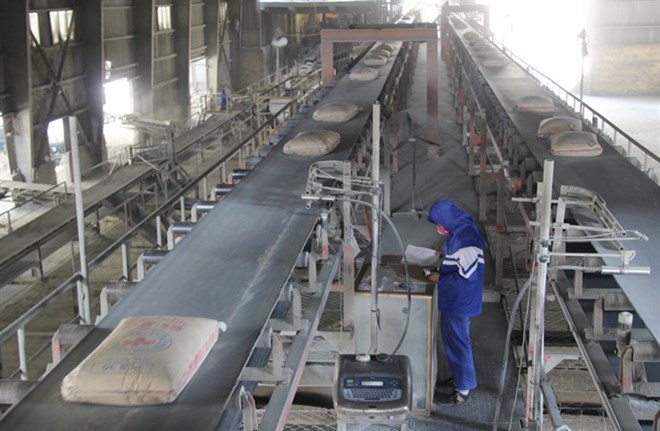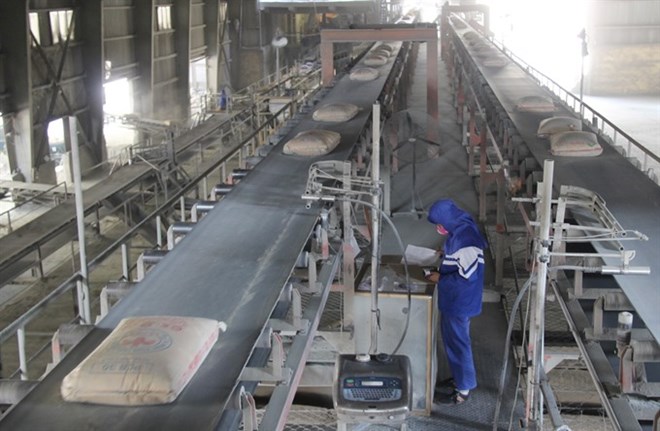
The development strategy of the cement industry by 2030 towards 2050 would ensure a balance between the supply and demand for cement.
A cement production line at La Hien Cement VVMI JSC in the northern province of Thai Nguyen (Source: VNA).
This is because the cement industry will have more supply with more cement factories being operational this year.
The strategy would be built based on the cement industry’s development over the past years, according to directions for the development of the cement industry by Deputy Prime Minister Trinh Dinh Dung.
The Vietnam Cement Association reported Vietnam has 83 cement production lines with a total capacity of 98.56 million tonnes. This capacity will continue to increase because the country is expected to have some cement production lines coming into operation this year with a total capacity of 10.1 million tonnes.
With those projects, the design capacity of Vietnam’s cement industry will be some 108.66 million tonnes.
The association said the actual production capacity of the cement industry can reach 120 million to 130 million tonnes per year. Meanwhile, in the plan, the total consumption of cement is expected to be 93 million tonnes by 2020. Therefore, the industry will have excessive supply of some 25 million to 30 million tonnes.
According to building material experts, there is a contradiction that while some new factories are set up or some existing ones are expanding production, some cement companies could not sell their products.
To deal with this situation, the association and the cement manufacturers have proposed that the Government and the Ministry of Construction should delay the investment in building cement factories during the period between 2019 and 2025.
The cement production lines coming into operation this year include production line 3 and 4 in the second phase at the Vissai Group’s Song Lam Cement Company, with a total capacity of 3.8 million tonnes per year, Ha Tien Kaitian Cement of Thai Group with a capacity of 4.5 million tonnes and Tan Thang Cement Company in Nghe An province with a capacity of 1.8 million tonnes per year.
Source: VNA
According to data from the Hoa Binh Provincial Party Committee, the industrial production index for the first six months of 2025 is estimated to have increased by 20% compared to the same period last year. This marks the highest year-on-year growth rate for this period since 2020.
In the first six months of 2025, Hoa Binh province’s export turnover was estimated at 1.145 billion USD, marking an 18.11% increase compared to the same period in 2024. Import turnover was estimated at $ 804 million, a 17.15% increase, which helped the province maintain a positive trade balance.
The lives of the ethnic minority farmers in Tan Lac district have gradually improved thanks to the new directions in agricultural production. This is a testament to the collective strength fostered through the professional associations and groups implemented by various levels of the district’s Farmers’ Union.
With the motto the "product quality comes first,” after nearly one year of establishment and operation, Muong village’s Clean Food Agricultural and Commercial Cooperative, located in Cau Hamlet, Hung Son Commune (Kim Boi district), has launched reputable, high-quality agricultural products to the market that are well-received by consumers. The products such as Muong village’s pork sausage, salt-cured chicken, and salt-cured pork hocks have gradually carved out a place in the market and they are on the path to obtaining the OCOP certification.
In the past, the phrase "bumper harvest, rock-bottom prices" was a familiar refrain for Vietnamese farmers engaged in fragmented, small-scale agriculture. But today, a new spirit is emerging across rural areas of Hoa Binh province - one of collaboration, organisation, and collective economic models that provide a stable foundation for production.
Maintaining growing area codes and packing facility codes in accordance with regulations is a mandatory requirement for agricultural products to be eligible for export. Recently, the Department of Agriculture and Environment of Hoa Binh province has intensified technical supervision of designated farming areas and packing facilities to safeguard the "green passport" that enables its products to access international markets.



